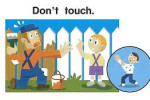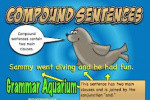 4 Terms
4 TermsContributors in Grammar
Grammar
inverted commas
Language; Grammar
Punctuation marks which are placed to either side of a quotation or speech in the text. They can also be used to indicate a different meaning of a word or phrase than the one typically associated ...
Conjunction
Language; Grammar
The part of speech that joins words, phrases, clauses, or sentences. There are three kinds of conjunctions in English: # '''Coordinate conjunctions''' join similar words, phrases, or clauses to each ...

Imperative sentence
Language; Grammar
A sentence that gives advice or instructions or that expresses a request or a command. An imperative sentence usually drops the subject. Example 1: Take this to your parents. Example 2: Stop talking!

Compound sentence
Language; Grammar
A sentence that contains at least two independent clauses, often joined by a conjunction. Example: The rabbit runs faster than the turtle, and the turtle has stronger endurance than the rabbit.
Passive voice
Language; Grammar
A verb form in which the subject receives the verb's action. Contrast with active voice. The passive voice is used when the subject is being acted upon rather than doing something. It's created by ...
auxiliary verb
Language; Grammar
A verb that is used with a main verb to provide further information about the action. For example, '''be''', '''do''' and '''have''' are auxiliary verbs. The words '''can''', '''may''', '''must''' ...
V1, V2, V3
Language; Grammar
Referring to Verb 1, Verb 2, Verb 3 - being the base, past and past participle that students typically learn for irregular verbs.
Featured blossaries
badr tarik
0
Terms
57
Blossaries
2
Followers
The World's Most Valuable Brands
 10 Terms
10 Terms

